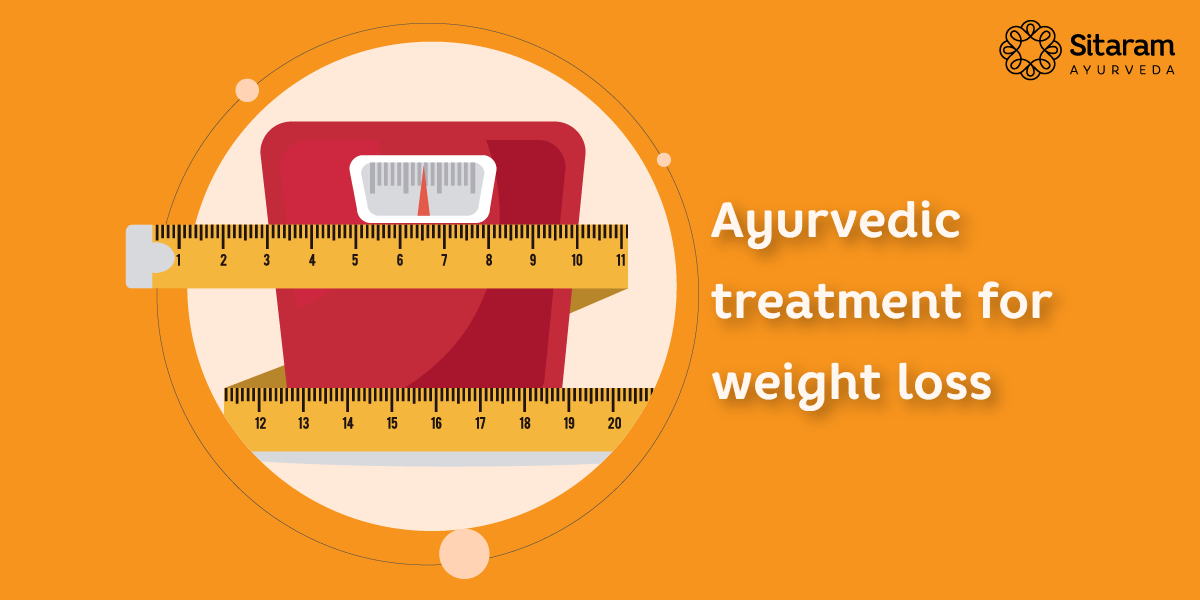Ayurvedic Treatment for Weight Loss

Obesity is not a mere condition but a disease. Obesity is a severe and complex mechanism that increases the possibility of disorders and health issues. Obese people are more prone to heart disease, high blood pressure, and diabetes.
Today Obesity is a significant problem not only in developed countries but also in developing and underdeveloped countries. There are more obese people than those with malnutrition. Similarly, childhood obesity poses a more significant threat than ever before.
Obesity Definition
Obesity is defined as abnormal or excessive fat accumulation that presents a risk to health. Body mass index above 25 is overweight, and above 30 is characterized as obese. (WHO definition)
What is Body Mass Index (BMI)?
BMI is a person’s weight in kilograms divided by the square of height in meters. BMI is often the first measurement to assess your overall health and wellbeing.
BMI categories
Below 18.5 – underweight
25 – 29.9 – overweight
above 30 – obese
Causes of Obesity
Genetic cause: Obesity shows hereditary traits associated with environmental factors. Studies show that obesity run in families where there is a change in a particular gene called MC4R.
Behavioral cause: This includes high energy diets, high sugar consumption, improper eating patterns, low physical activity, and a sedentary lifestyle.
Metabolic cause: Obesity forms a significant part of metabolic syndrome. It is closely related to insulin resistance, overweight, and inactivity.
Hormonal cause: Obesity can be associated with several endocrinal alterations. Hormonal disorders like hypothyroidism, Cushing’s syndrome, etc., cause Obesity.
Risk Factors of Obesity
There are many risk factors for Obesity.
- Genetic influence: Experts opine that Obesity tends to run in families.
- Lifestyle: This includes an unhealthy diet and a sedentary lifestyle. An unhealthy diet includes high-calorie foods, fast foods and high-calorie beverages. A low fibre diet also contributes to Obesity. Inactivity is highly associated with weight gain.
- Diseases and medications: Certain diseases like hypothyroidism, Polycystic ovarian syndrome (PCOD), Cushing’s syndrome cause obesity. Certain steroids, anti-diabetic drugs, anti-psychotic drugs may lead to overweight.
- Lack of sleep: This may derange your metabolism resulting in Obesity.
- Stress: Stress and depression sometimes lead to ‘over eating’, leading to Obesity.
Complications
Obese people are likely to develop potential health issues like
Type 2 diabetes
Heart diseases
Gynecological problems
Digestive issues
Lack of sleep
Osteoarthritis
Cosmetic issues
Psychological problems
Ayurvedic advice on Weight Loss
Ayurveda explains Obesity as Sthoulya. Etiology, symptoms, treatment of Sthoulya are explained in detail in Charaka Samhitha. Sthoulyatha is also explained in the context of diabetes. Vagbhata, in his book Ashtanga Sangraham, describes the remedy for an obese person as remote. Hence Ayurveda advises a multipronged strategy in the management of Obesity. Treatment includes lifestyle modifications, preventive measures, and medical management.
- Practise a healthy lifestyle
Apart from disease management, Ayurveda describes the regimen for a healthy person too. There are examples of daily and seasonal routines for a healthy lifestyle. Dietary practises are also explained in classical Ayurvedic texts like Charaka Samhitha. The daily routine includes things to be followed in one day, i.e. waking up to sleep.- Try to wake up at Brahma Muhoortha (two hours before sunrise)
- Try to have a night of proper sleep at night for at least seven hours.
- Avoid day sleep except in the summer season.
- Diet : Diet plays as much importance as medicine in Ayurveda.
- One can take Navara rice, green gram, rock salt, barley, milk, pure water, ghee and honey on all days.
- Avoid daily intake of long pepper, highly alkaline foods and highly salty foods, high sugar foods.
- Take food at the proper time. Correct your body such that you will have good hunger at the appropriate time.
- Take food according to the need of the body.
- Try to include all the six tastes( shad rasa) in your daily food
- Try to have hot, fresh food
- Rich your diet with barley and wheat products
- Proper exercise: Proper exercise according to the body strength keeps your energy level high.
- Ayurvedic drugs:
- Siva Gulika
- Varadi Kashaya tablet
- Treatment
a)Udvarthanam (powder massage): Rubbing of the body using powder is Udvarthanam.
b)Utsadanam: Mixing the powder with medicated oil or medicated liquid and applying this paste over the body is Utsadanam. Studies show that Udvarthanam and Utsadanam have an excellent effect in reducing body weight.
c)Swedana procedure (fomentation): Steam bath helps in weight loss.
d)Application of different Kizhi(pottali): Application of suitable Pottalies helps to reduce weight.
Panchakarma (Purification) Procedure
Panchakarma includes five detoxification procedures (medicated enema, medicine-induced vomiting, drug-induced purgation, and bloodletting). These Panchakarmas include pre and post preparatory procedures and must be done only under medical supervision.
To Buy Siva Gulika Online:
To Buy Varadi Kashaya Tablet: https://www.sitaramayurveda.com/product/varadi-kashaya-tablet/


 Sign In
Sign In Cart
Cart
Thank you for your generous sharing; it’s a fantastic blog to visit because most people face these serious issues.